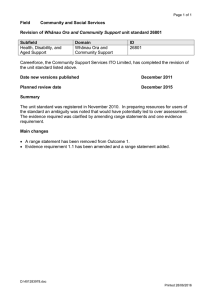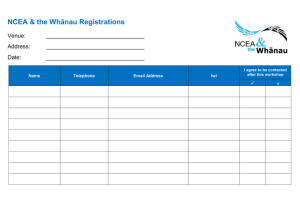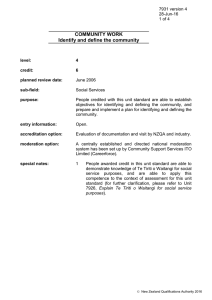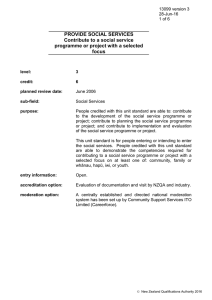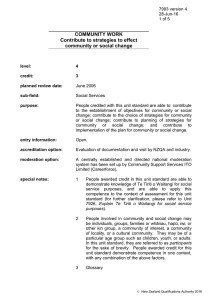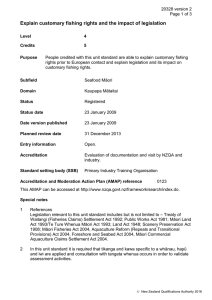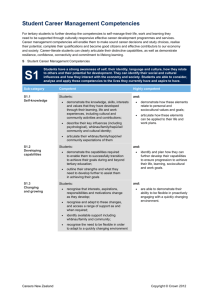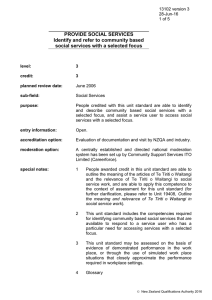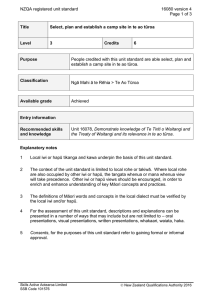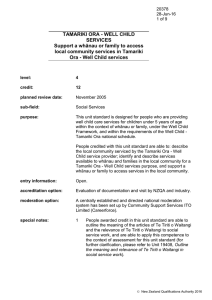TAMARIKI ORA - WELL CHILD SERVICES Describe the impacts of colonisation on
advertisement
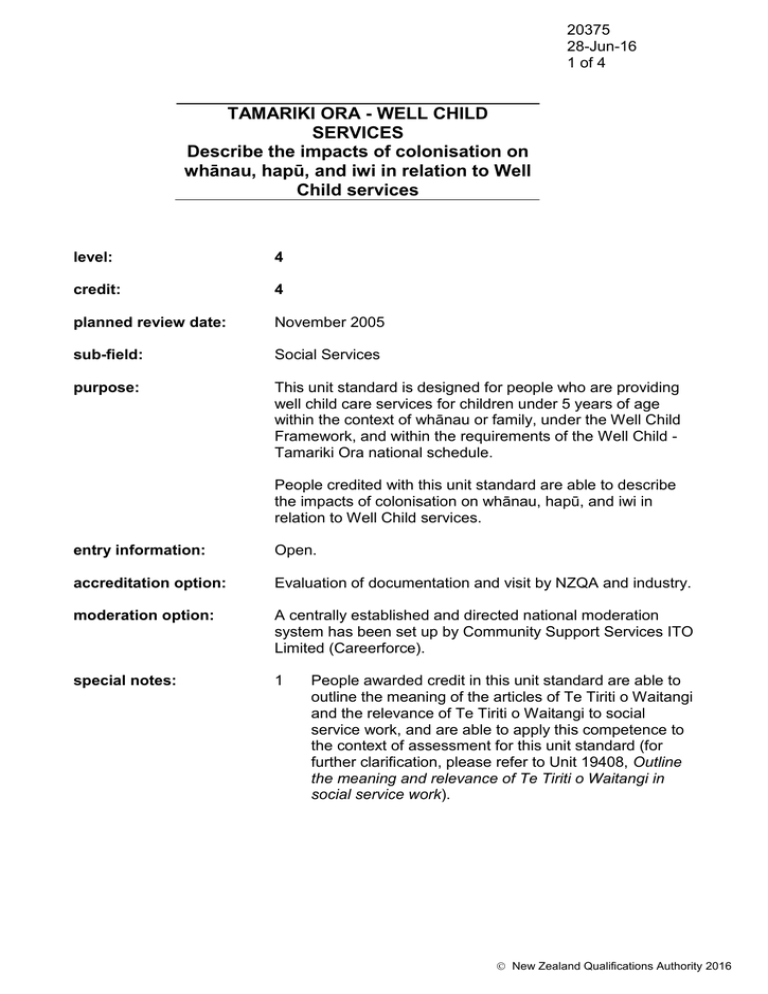
20375 28-Jun-16 1 of 4 TAMARIKI ORA - WELL CHILD SERVICES Describe the impacts of colonisation on whānau, hapū, and iwi in relation to Well Child services level: 4 credit: 4 planned review date: November 2005 sub-field: Social Services purpose: This unit standard is designed for people who are providing well child care services for children under 5 years of age within the context of whānau or family, under the Well Child Framework, and within the requirements of the Well Child Tamariki Ora national schedule. People credited with this unit standard are able to describe the impacts of colonisation on whānau, hapū, and iwi in relation to Well Child services. entry information: Open. accreditation option: Evaluation of documentation and visit by NZQA and industry. moderation option: A centrally established and directed national moderation system has been set up by Community Support Services ITO Limited (Careerforce). special notes: 1 People awarded credit in this unit standard are able to outline the meaning of the articles of Te Tiriti o Waitangi and the relevance of Te Tiriti o Waitangi to social service work, and are able to apply this competence to the context of assessment for this unit standard (for further clarification, please refer to Unit 19408, Outline the meaning and relevance of Te Tiriti o Waitangi in social service work). New Zealand Qualifications Authority 2016 20375 28-Jun-16 2 of 4 TAMARIKI ORA - WELL CHILD SERVICES Describe the impacts of colonisation on whānau, hapū, and iwi in relation to Well Child services 2 It is expected that candidates seeking credit for this unit standard will demonstrate competence and be assessed through a combination of theoretical learning and practical experience as a Well Child worker in Tamariki Ora - Well Child services. This may include classroom activities, and will include work-based settings and practical experience. 3 Resources a Edwards, Mihi. 1990. Mihipeka: Early years. Auckland: Penguin. b Edwards, Mihi. 1992. Mihipeka: Time of turmoil: Ngā wā raruraru. Auckland: Penguin. c Edwards, Mihi. 2002. Mihipeka: Call of an elder: Karanga a te kuia. Wellington: Steele Roberts. d Ministerial Advisory Committee on a Māori Perspective for the Department of Social Welfare. 2001 Reprint. Puao-Te-Ata-Tu (day break) The Report of the Ministerial Advisory Committee on a Māori Perspective for the Department of Social Welfare. Wellington: Department of Social Welfare. It is available from the internet website for Child, Youth and Family. The address for the website is: Child, Youth and Family: http://www.cyf.govt.nz/ (follow the links to Reports and Publications up to 2000). e Ministry of Health. March 2002. The Well Child framework. Wellington: Ministry of Health. f Ministry of Health. November 2002. Well Child Tamariki Ora national schedule handbook. Wellington: Ministry of Health. g Ministry of Health. 2002. Well Child - Tamariki Ora national schedule. Wellington: Ministry of Health. All of these Ministry of Health publications are available on the Ministry of Health web site: http://www.moh.govt.nz/ New Zealand Qualifications Authority 2016 20375 28-Jun-16 3 of 4 TAMARIKI ORA - WELL CHILD SERVICES Describe the impacts of colonisation on whānau, hapū, and iwi in relation to Well Child services Elements and Performance Criteria element 1 Describe the impacts of colonisation on whānau, hapū, and iwi in relation to Well Child services. Range: evidence is required of the impacts of colonisation on whānau, hapū, and iwi in general, though examples may be given of the impacts of colonisation on particular whānau, hapū, or iwi. performance criteria 1.1 Elements of the colonisation process, and the impacts of colonisation on whānau, hapū, and iwi are described. Range: elements of the colonisation process - alcohol, church, economics, education, government, institutionalisation, legislation, media, military; impacts may include but are not limited to - loss of tino rangatiratanga; economic, social, and political marginalisation; loss of economic status; loss of land; cultural damage through imposition of monocultural concepts of education, "family"; health, language, and spirituality; urbanisation. 1.2 The impacts of colonisation on whānau, hapū, and iwi are described according to Puao-Te-Ata-Tu (day break) - The Report of the Ministerial Advisory Committee on a Māori Perspective for the Department of Social Welfare. 1.3 The impacts of colonisation are described in terms of the implications for Tamariki Ora - Well Child services. Range: implications for include but are not limited to - Well Child service provider; Well Child worker; whānau, hapū and iwi. New Zealand Qualifications Authority 2016 20375 28-Jun-16 4 of 4 TAMARIKI ORA - WELL CHILD SERVICES Describe the impacts of colonisation on whānau, hapū, and iwi in relation to Well Child services Comments on this unit standard Please contact the Community Support Services ITO Limited (Careerforce) info@careerforce.org.nz if you wish to suggest changes to the content of this unit standard. Please Note Providers must be accredited by the Qualifications Authority or a delegated interinstitutional body before they can register credits from assessment against unit standards or deliver courses of study leading to that assessment. Industry Training Organisations must be accredited by the Qualifications Authority before they can register credits from assessment against unit standards. Accredited providers and Industry Training Organisations assessing against unit standards must engage with the moderation system that applies to those standards. Accreditation requirements and an outline of the moderation system that applies to this standard are outlined in the Accreditation and Moderation Action Plan (AMAP). The AMAP also includes useful information about special requirements for providers wishing to develop education and training programmes, such as minimum qualifications for tutors and assessors, and special resource requirements. This unit standard is covered by AMAP 0222 which can be accessed at http://www.nzqa.govt.nz/site/framework/search.html. New Zealand Qualifications Authority 2016
